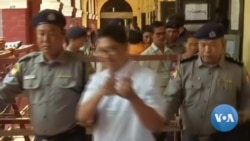ມຽນມາ ໄດ້ປ່ອຍຕົວພວກນັກຂ່າວ 2 ຄົນ ໃນວັນອັງຄານວານນີ້ ຊຶ່ງ ມີຂຶ້ນແບບບໍ່ໜ້າ
ເຊື່ອ ແລະໜ້າຍິນດີສຳລັບຄອບຄົວ ແລະພວກທີ່ສະໜັບສະໜຸນເຂົາເຈົ້າ, ແຕ່ວ່າ
ພວກທີ່ສະໜັບສະໜຸນເສລີພາບໃນການສື່ຂ່າວ ບໍ່ເຊື່ອວ່າການກະທຳດັ່ງກ່າວ
ແມ່ນໝາຍຄວາມວ່າ ໄດ້ມີການປ່ຽນແປງທີ່ແທ້ຈິງເກີດຂຶ້ນຢູ່ໃນປະເທດແຫ່ງນັ້ນ.
ນັກຂ່າວທັງສອງຄົນໄດ້ຮັບການນິລະໂທດກຳ ຫຼັງຈາກໄດ້ຕິດຄຸກມາເປັນເວລາ
ຫຼາຍກວ່າ 500 ມື້ ຍ້ອນໄດ້ໄປເອົາຂ່າວກ່ຽວກັບການປະຫັດປະຫານຂອງລັດຖະບານ
ຕໍ່ຊາວມຸສລິມໂຣຮິງຢາ. ໄບຣອັນ ແພນເດັນ ມີລາຍງານເພີ້ມຕື່ມກ່ຽວກັບເລື້ອງນີ້
ຊຶ່ງວັນນະສອນ ຈະນຳມາສະເໜີທ່ານ ໃນອັນດັບຕໍ່ໄປ.
ພວກນັກຂ່າວຂອງອົງການຂ່າວຣອຍເຕີຣ໌ ທ່ານວາ ໂລນ ແລະ ທ່ານໂຈ ຊໍ ອູ ໂອບກອດ
ຄອບຄົວຂອງພວກເຂົາເຈົ້າ ຫຼັງຈາກໄດ້ຖືກປ່ອຍຕົວໃນວັນອັງຄານວານນີ້. ບັນດາ
ເພື່ອນຮ່ວມງານຂອງເຂົາເຈົ້າ ຢູ່ທີ່ອົງການຂ່າວຣອຍເຕີຣ໌ ກໍພາກັບຊົມຊື່ນຍິນດີກັບຂ່າວ
ທີ່ໄດ້ຄອງຄອຍຖ້າໄດ້ຍິນມາ ແຕ່ດົນນັ້ນ.
ທ່ານ Steve Adler ຫົວໜ້າບັນນາທິການຂອງອົງການຂ່າວຣອຍເຕີຣ໌ ກ່າວວ່າ “ນັບຕັ້ງ
ແຕ່ມີການຖືກຈັບພວກເຂົາເຈົ້າໃນ 511 ມື້ ກ່ອນນັ້ນເປັນຕົ້ນມາ ພວກເຂົາເຈົ້າ ກໍໄດ້
ກາຍມາເປັນສັນຍາລັກຂອງເສລິພາບໃນການສື່ຂ່າວ ຢູ່ທົ່ວໂລກ. ພວກເຮົາຍິນດີ
ຕ້ອນຮັບການກັບມາຂອງພວກເຂົາເຈົ້າ.”
ນັກຂ່າວຂອງອົງການຂ່າວຣອຍເຕີຣ໌ສອງຄົນດັ່ງກ່າວແມ່ນຖືກຕິດຄຸກຍ້ອນຖືກກ່າວຫາ
ວ່າໄດ້ລະເມີດກົດໝາຍກ່ຽວກັບຄວາມລັບຂອງປະເທດ, ຊຶ່ງເປັນການກ່າວຫາ ທີ່ເຊື່ອ
ກັນຢ່າງກວ້າງຂວາງວ່າ ເປັນເລື້ອງເສກສັນປັ້ນແຕ່ງຂຶ້ນມາ ແລະຖືກໃຊ້ເພື່ອລົງໂທດ
ພວກກ່ຽວທີ່ໄດ້ລາຍງານກ່ຽວກັບການສັງຫານຊາວມຸສລິມ ໂຣຮິງຢາ ໂດຍກອງກຳລັງ
ຮັກສາຄວາມສະຫງົບຂອງມຽນມາ ໃນປີ 2017.
ທ່ານ Phil Robertson ຈາກອົງການສິ້ງຊອມສິດທິມະນຸດ Human Rights Watch
ກ່າວວ່າ: “ມັນກໍນັບວ່າເປັນທີ່ຈະແຈ້ງແລ້ວວ່າ ພວກເຂົາເຈົ້າບໍ່ໄດ້ເຮັດຫຍັງຜິດເລີຍ.
ນີ້ແມ່ນເລື້ອງຂອງລັດຖະບານ ແລະຝ່າຍທະຫານທີ່ພະຍາຍາມລົງໂທດພວກທີີ່ຕຳໜິ,
ຜູ້ທີ່ກ້າທີ່ຈະລາຍງານກ່ຽວກັບເລື້ອງທີ່ພວກເຂົາບໍ່ມັກ.”
ການກົດດັນຈາກປະເທດຕາເວັນຕົກທີ່ມີປະຊາທິປະໄຕ ແລະກຸ່ມສະໜັບສະໜຸນ
ເຂົາເຈົ້າ ອາດຈະໄດ້ຊ່ອຍຮັບປະກັນເຮັດໃຫ້ມີການປ່ອຍຕົວຂອງພວກກ່ຽວ, ພ້ອມທັງ
ພວກນັກໂທດຫຼາຍພັນຄົນ ຊຶ່ງເປັນສ່ວນນຶ່ງຂອງປະເພນີການນິລະໂທດກຳ ປະຈຳປີ.
ທ່ານ Christopher Walker ຈາກອົງການ National Endowment for Democracy
ກ່າວວ່າ “ຂ້າພະເຈົ້າຄິດວ່າ, ມັນເຖິງຂັ້ນວ່າ, ພວກເຮົາທຸກຄົນ, ແນ່ນອນຢູ່ໃນສັງຄົມ
ແບບມີປະຊາທິປະໄຕ ສາມາດທີ່ຈະໃຫ້ການສະໜັບສະໜຸນ ແກ່ການອອກຂ່າວຢ່າງ
ອິດສະຫຼະ ແລະສື່ທີ່ມັນເກີດຜົນປະໂຫຍດຕໍ່ພວກເຮົາ ເພາະວ່າ ໃນທີ່ສຸດພວກເຮົາກໍ
ຈະມີການປົກຄອງຂອງລັດຖະບານທີ່ມີຄວາມຮັບຜິດຊອບ ແລະມີຫລັກນິຕິຫຼາຍຂຶ້ນ
ແລະຜົນໄດ້ຮັບທີ່ດີຂຶ້ນກວ່າເກົ່າ.”
ແຕ່ວ່າ ການປ່ອຍຕົວຂອງພວກນັກຂ່າວດັ່ງກ່າວກໍມີຂຶ້ນພ້ອມກັບການເຕືອນຕໍ່ພວກ
ນັກຂ່າວທັງຫຼາຍທີ່ເຮັດວຽກເກັບກຳຂ່າວຢູ່ໃນສະພາບທີ່ຈຳກັດການສື່ຂ່າວໃນລະດັບ
ສູງແຫ່ງນັ້ນ.
ທ່ານ Daniel Bastard ນັກຂ່າວຈາກອົງການຂ່າວທີ່ໄຮ້ພົມແດນ ຫຼື Reporters
Without Borders ກ່າວວ່າ “ຂໍ້ຄວາມຈາກລັດຖະບານມຽນມາ ກໍຄືໂອເ, ພວກເຮົາ
ລ້ວນແລ້ວແຕ່ແມ່ນມະນຸດ. ພວກເຮົາຊາບດີວ່າ ທ່ານຕ້ອງການພົບກັບຄອບຄົວຂອງທ່ານອີກຕໍ່ໄປ, ແຕ່ວ່າ ຢ່າກ້າທີ່ຈະຂ້າມເສັ້ນຂີດໄວ້ນັ້ນອີກຕໍ່ໄປ.”
ກໍລະນີຂອງການຕິດຄຸກຂອງພວກນັກຂ່າວຣອຍເຕີຣ໌ ໃນມຽນມາ ແມ່ນເປັນພຽງນຶ່ງໃນ
ຈຳນວນວິທີການໂຈມຕີ ແລະຂົ່ມຂູ່ເທົ່ານັ້ນ ທີ່ເອົາມາໃຊ້ນັບມື້ນັບຫລາຍຂຶ້ນ ຕໍ່ພວກ
ນັກຂ່າວ.
ນັກຂ່າວ Susan Repucci ຈາກອົງການຂ່າວ Freedom House ກ່າວວ່າ
“ມັນເປັນພຽງຢົດນ້ຳຢົດນຶ່ງ ໃນຄຸນ້ຳຂອງການຈັບກຸມແລະການສັງຫານຂອງພວກ
ນັກຂ່າວທີ່ໃຫຍ່ໃນທົ່ວໂລກ ແລະນັ້ນມັນແມ່ນການຕໍ່ສູ້ທີ່ພວກເຮົາຈະຕ້ອງສືບຕໍ່
ຕໍ່ສູ້ໄປເລື້ອຍໆ.”
ອົງການສະຫະປະຊາຊາດ ກ່າວວ່າ ການນິລະໂທດກຳນີ້ ບໍ່ໄດ້ໝາຍເຖິງຄວາມຄືບໜ້າ
ທີ່ສຳຄັນໃນເລື້ອງສິດໃນການປາກເວົ້າໃນມຽນມາເລີຍ...ຊຶ່ງເປັນປະເທດທີ່ກຳລັງຂ້າມ
ຜ່ານຈາກການມີລັດຖະບານທາງທະຫານ ໄປສູ່ການປົກຄອງ ການມີລັດຖະບານທີ່ນຳພາໂດຍພົນລະເຮືອນ.
ອ່ານຂ່າວນີ້ເພີ້ມຕື່ມເປັນພາສາອັງກິດ
Myanmar's release of two journalists on Tuesday came as a welcome surprise to families and supporters, but free press advocates are skeptical the move means real change has come to the nation. The journalists were granted amnesty after spending more than 500 days in prison for covering the government crackdown on Rohingya Muslims. VOA's Brian Padden reports.
Reuter's journalists Wa Lone and Kyaw Soe Oo embraced their families after being released from prison on Tuesday. Their colleagues at Reuters also celebrated the long anticipated news.
Steve Adler, Editor-in-chief, Reuters News Agency: "Since their arrest five hundred and eleven days ago they have become symbols of the importance of press freedom around the world. We welcome their return."
The two Reuters journalists were jailed for allegedly violating state secrecy laws, charges that were widely believed to be falsified and used to punish them for reporting on the killing of Rohingya Muslims by Myanmar security forces in 2017.
Phil Robertson, Human Rights Watch: "It's quite clear that they did nothing wrong here. This is all about the government and the military trying to persecute critics who dare report stories that they don't like."
Pressure from Western democracies and advocacy groups may have helped secure their release, along with thousands of other prisoners as part of an annual amnesty tradition.
Christopher Walker, National Endowment for Democracy:
"I think, to the extent, all of us, certainly in democratic societies can help support independent journalism and media it redounds to our benefit, because ultimately, we'll have more accountable governance and the rule of law and better outcomes."
But their release also comes with a warning to all journalists that work in this highly restricted media environment.
Daniel Bastard, Reporters Without Borders: "Myanmar government's message is that okay, we are human. We know you need to meet with your family again, but don't dare to cross the line anymore."
The case of jailed Reuters reporters in Myanmar is just one of a growing number of assaults and intimation tactics used against journalists.
Susan Repucci, Freedom House: "It is only one drop in a huge bucket of arrests and murders of journalists around the world. And it's definitely a battle that we have to keep fighting."
The United Nations says this reprieve does not indicate significant free speech progress in Myanmar...a country still in transition from a military to civilian led government.





